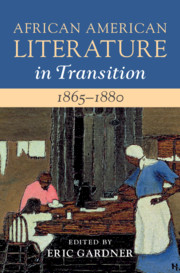Book contents
- African American Literature in Transition, 1865–1880
- African American Literature in Transition
- African American Literature in Transition, 1865–1880
- Copyright page
- Contents
- Figures
- Contributors
- Preface
- Chronology
- Black Reconstructions: Introduction
- Part I Citizenships, Textualities, and Domesticities
- Chapter 1 Sketching Black Citizenship on Installment after the Fifteenth Amendment
- Chapter 2 Stories of Citizenship: The Rise of Narrative Black Poetry during Reconstruction
- Chapter 3 National Housekeeping: (Re)dressing the Politics of Whiteness in Nineteenth-Century African American Literary History
- Chapter 4 Reconstructing the Rhetoric of AME Ministry
- Part II Persons and Bodies
- Part III Memories, Materialities, and Locations
- Index
Chapter 4 - Reconstructing the Rhetoric of AME Ministry
from Part I - Citizenships, Textualities, and Domesticities
Published online by Cambridge University Press: 18 March 2021
- African American Literature in Transition, 1865–1880
- African American Literature in Transition
- African American Literature in Transition, 1865–1880
- Copyright page
- Contents
- Figures
- Contributors
- Preface
- Chronology
- Black Reconstructions: Introduction
- Part I Citizenships, Textualities, and Domesticities
- Chapter 1 Sketching Black Citizenship on Installment after the Fifteenth Amendment
- Chapter 2 Stories of Citizenship: The Rise of Narrative Black Poetry during Reconstruction
- Chapter 3 National Housekeeping: (Re)dressing the Politics of Whiteness in Nineteenth-Century African American Literary History
- Chapter 4 Reconstructing the Rhetoric of AME Ministry
- Part II Persons and Bodies
- Part III Memories, Materialities, and Locations
- Index
Summary
Eric Gardner’s “Reconstructing the Rhetoric of AME Ministry” begins to consider how a group long crucial to Black print – ministers and church activists – adapted religious rhetoric after the Civil War and specifically reached into militaristic language in ways that allowed Black writers and readers to think about national and local citizenship, church engagement, the mission and meaning of the Civil War, the continuing violence surrounding many Black lives, and Black print within the larger arena of Black faith. Initially anchored in two key books published early in Reconstruction by major AME figures, Bishop Daniel Payne’s The Semi-Centenary and the Retrospection of the African Methodist Episcopal Church and Benjamin Tucker Tanner’s An Apology for African Methodism, the essay broadens to consider how such rhetorics reached into texts such as Harper’s serialized Recorder novel Sowing and Reaping and Henry McNeal Turner’s eulogy to Charles Sumner.
Keywords
- Type
- Chapter
- Information
- African American Literature in Transition, 1865–1880Black Reconstructions, pp. 87 - 112Publisher: Cambridge University PressPrint publication year: 2021

